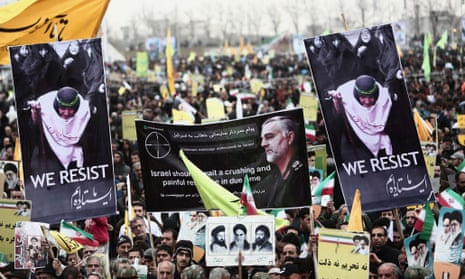A bulletin from the Expediency Council, a state body chaired by influential former president Akbar Hashemi Rafsanjani, has offered rare insight into Iran’s strategic thinking over Iraq.
The report, from the council’s Centre for Strategic Research, entitled Concerns about Iraq and Considerations for the Future, has not been widely publicized. The author, Hassan Ahmadian, is an analyst at the council.
One “positive event of major importance” highlighted by Ahmadian is the west’s acceptance of Iranian weapons sales to Iraq insofar as they contribute to the broader struggle against the Islamic State group (Isis), despite a United Nations embargo on Iranian arms exports. But the report also warns that a weakening of Isis will lead the west one again to question Iran’s role.
Expressions of concern over Iran’s role against Isis by the United States have been muted. It “would raise serious concerns,” Jennifer Psaki, state department spokeswoman, said last year. Passed in 2007, UN Security Council Resolution 1747 bans Iran’s sale or export of heavy arms.
Iranian officials have never confirmed the extent of arms supplies. However, a figure of $16bn was given in January by Mehdi Tayeb, head of the Ammar base, a body set up to respond to the alleged “soft war” of the US against Iran in the wake of unrest after the disputed 2009 presidential election. Speaking in the Emam Javad mosque in Tehran on 19 January, Tayeb said this was the amount supplied since Isis’ “first attacks”, possibly referring to the group’s offensive last June when it seized a swathe of Iraq including the northern city of Mosul.
This confirms a huge increase in the flow of arms from Iran since Reuters in February last year acquired evidence of $195m in Iranian weapon supplies including mortars, tank parts, artillery, night-vision goggles and wireless communications equipment.
The Expediency Council bulletin reflects a growing sense in Iran that its role in Iraq is being perceived more favourably. As well as citing a relaxed western attitude towards arms supplies, it finds an increasing regional and global acceptance of the Quds force, the overseas arm of the IRGC (Islamic Revolutionary Guard corps). The report points out the western media are less inclined to identify the Quds force’s activities as “terrorism”, and that several western officials have requested meetings with its leader General Qassem Suleimani.
The report suggests the more favourable evaluation of Iran by foreign powers has also resulted from Tehran’s work last summer in negotiating the transition from Nouri al-Maliki to Haidar al-Abadi as prime minister, and from its “unprecedented” role in bringing at least a temporary solution to problems between Iraqi Kurdistan and Iraq’s central government.
But the bulletin also highlights recent developments in Iraq it says threaten Iranian interests. One “serious challenge” is Iraq’s improving relations with other regional states, including Saudi Arabia and Turkey. The bulletin emphasises that while Iraq has been the main source of assistance to Iraq against Isis, Turkey and Saudi Arabia are now taking advantage of Iraq’s security needs.
The report also considers a request – apparently made discretely by Iraq – for discussions over border arrangements. This has been a sensitive issue since the 1975 Algiers Accord, in which Iraq made a concession in agreeing the southern border as the thalweg, or deepest channel, of the Shatt al-Arab waterway (known to Iranians as Arvand Rud): Saddam Hussein revoked the agreement in 1980 as he launched an eight-year war with Iran, but it was restored as part of the ceasefire in 1988.
The bulletin identifies a further challenge in Iraq’s steps toward establishing a Sunni national guard to restore some Sunni Arab influence in a Shia-dominated political landscape, and points out the US is supporting the guard’s formation and training Arab Sunni tribes with help from Jordan. The report suggests such a plan could weaken the control of Iraq’s central government over provinces with Sunni Arab majorities.
Running through the report is the suggestion that with Isis now on the defensive, and concerns over the danger it poses diminishing, questions over Iran’s role in Iraq may again come to the fore. It therefore warns Iran’s leaders to be prepared for inevitable “pressure”.
In driving its point home, the bulletin refers to the sanctions committee of the UN Security Council identifying three cases of sanctions violations over arms exports by Tehran, one of which – previously unreported, it says – is Suleimani’s presence in Iraq.
Hence the report will be all the more closely read in Iran’s leadership circles after the claim from Suleimani last week that Isis and other “terrorist groups in Iraq and Syria...are nearing the end of their lives”.
Presented in partnership with Digarban

Comments (…)
Sign in or create your Guardian account to join the discussion